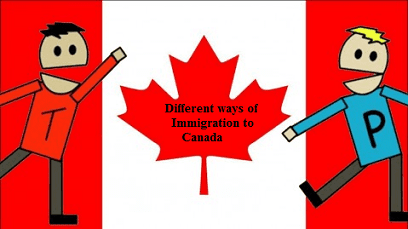Different ways of Immigrating to Canada
Why Immigrate to Canada?
Many foreigners like to immigrate to Canada for many of the wonderful benefits this country has to offer such as the medical benefits, great weather, strict gun laws, great education system and most importantly its multiculturalism. Some of the ways a foreigner can immigrate to Canada would be the Federal Skilled Worker Program, The Federal Skilled Trades Program, Canadian Experience Class, Provincial Nominee Program, Start-up Visa, Study Visa, Family Class Sponsorship etc. This article will discuss some of the ways you can immigrate to Canada for permanent residency.
Immigrating to Canada as a Foreign Skilled Worker
Foreign skilled workers and professionals are welcomed to Canada, because the Canadian government looks for skilled workers who can contribute to Canada’s economy. If you have specials skills as a foreign worker you can apply under the Federal Skilled Worker Program for eligibility for permanent residency to Canada. If you like to reside in a particular province of Canada you can look into the Provincial Nominee Program and see if you meet the requirements under the province. Most Canadian provinces and territories have their own programs for skilled workers. The PNP allows foreign workers to move to Canada faster than most other immigration programs.
Immigrating to Canada under the Canadian Experience Class (CEC)
The Canadian Experience Class welcomes foreign workers that have gained Canadian work experience. If you have worked in Canada and have made strong connections with your community and working on establishing your career in Canada then submitting an application through the Express Entry program may increase your chances for invitation for permanent residency to Canada. To be eligible under the CEC as the applicant you need to meet minimum requirements.
- Having gained at least 1 year of professional work experience in Canada
- Meeting language requirements
- Planning to work and live in Canada
When applying under the CEC you can remain in Canada while the application is getting processed or you can apply outside of Canada within three years of leaving your job in Canada.
Immigrating to Canada as an International Student
Canada’s education system offers top colleges and universities with affordable fees for foreign students to study in Canada and offers opportunities for future residency in Canada. So if you have graduated from a college or university in Canada and have gained one year of work experience in a skilled, professional or technical field then you can be eligible to apply through the Express Entry under the Canadian Experience Class to obtain permanent residency in Canada.
Basic requirement you need to meet to obtain a Canadian Study Permit
In order to study in Canada the first step would be having obtained the acceptance letter from a college or university in Canada. Once you have received your acceptance letter you are eligible to apply for study permit to Canada. The study permit is only needed if your program is longer than six months. To be eligible for the study permit you need to show valid travel document to the immigration officer. If you come from non-visa exempt country such as India, Pakistan, Afghanistan you need to apply for another documents called the visitor visa. Also, you need to show supporting documents that your stay in Canada is only temporary and will exit Canada once your permit expires. Upon completion of studies and having gained one year of professional work experience in Canada you may apply under different programs such as the Canadian Experience Class to see if you meet the requirements to obtain permanent residency in Canada.
Immigrating to Canada through Family Class Sponsorship
Do you have loved ones in Canada if so you could be eligible to apply for permanent residency in Canada through the Family Class Sponsorship. Immigration Canada believes strongly in reuniting family members with their loved ones. Individuals that qualify under the Family Class include spouses and common- law partners, dependent children and parents and grandparents.
Basic requirements for sponsoring spouse or common law partner
Requirements the sponsor has to meet include
- You have to be 18 years of age as the sponsor
- You have to be a Canadian or Permanent Resident of Canada
- You cannot be in prison as the sponsor, clear from bankruptcy, not charged with a serious offence or on a removal order
- As the sponsor you cannot have been sponsored as spouse to Canada within the past five years
Requirements the applicant has to meet (sponsored person) include
- The applicant has to be at least 16 years old
- The applicant cannot be closely related to the sponsor by blood
Proving genuineness in the relationship
- Legally married can show certificate of marriage if married in Canada as the spouse
- As the common law partner show that you have lived together continuously for one year
- As the conjugal person you must demonstrate that you cannot be together as spouse or common law partner due to special circumstances that is beyond your their control
Basic requirements to sponsoring parents and grandparents
Requirements the sponsor has to meet include
- The relative that is getting sponsored and the sponsor have to sign a sponsorship agreement that he/she will be supported by the family member financially
- As the sponsor you have to promise that you will support your family financially and anyone else that is joining them for 20 year period.
- As the sponsor you have to meet minimum financial requirements
Requirements you need to meet as the applicant (sponsored person)
- As the applicant you have to be the parent or grandparent of the sponsor
I have a job offer in Canada can I apply for permanent residency?
If you have employment offer in Canada and have successfully obtained the work permit as a foreign worker you may eligible to apply for permanent residency in the future in Canada. Depending on the nature of your work and your skill set you could be eligible under one of Canadian Experience Class, Arranged Employment or the Provincial Nominee Program.
Can I obtain permanent residency in Canada as a Live in Caregiver?
If you are a live in caregiver and have obtained positive LMIA and successfully obtained your live in caregiver work permit you can be eligible for future permanent residency if you meet LICG requirements.
The basic requirements for LICG include:
- Having 24 months full time live in employment or
- 3,900 hours of full time employment which can be completed over 22 month period
- Your work experience must be attained within 4 year of your arrival date
- You can claim up to 390 overtime hours
Contact Akrami & Associates:
If you like to immigrate to Canada or are on temporary basis in Canada and like to obtain permanent residency in Canada then contact our office at 416-477-2545 so we can help you determine which route will work best for your immigration needs. At Akrami and Associates we have assisted many clients in obtaining their permanent residency in Canada and we can help you too.
With Akrami and Associates there is always a way!!
Latest Immigrations News

December 5, 2025
THE ULTIMATE GUIDE TO HUMANITARIAN & COMPASSIONATE (H&C) APPLICATIONS IN CANADA
THE ULTIMATE GUIDE TO HUMANITARIAN & COMPASSIONATE (H&C) APPLICATIONS IN CANADA Understanding When, Why, and How to Apply for Permanent Residence on Humanitarian Grounds What Is an H&C Application? A Humanitarian and Compassionate (H&C) application is a last-resort pathway for individuals who are in Canada and do not [...]

September 11, 2025
Canada Super Visa: Step-by-Step Guide for Parents and Grandparents
For many Canadian citizens and permanent residents, bringing parents or grandparents to Canada for extended visits is more than just a wish, it’s a heartfelt need. While most people first consider the traditional visitor visa, there is another option designed specifically for family reunification: Super Visa applications. [...]

August 23, 2025
Intra-Company Transfer (ICT) Work Permit, Your Complete Guide to Working in Canada
For multinational companies, moving key talent across borders is often essential for growth and operational success. The Intra-Company Transfer (ICT) Work Permit provides a streamlined pathway to bring experienced employees to Canada without the time-consuming Labour Market Impact Assessment (LMIA) process. For foreign professionals, it’s more than [...]

Book a Conslutation
One of our Representatives will
assist you with your matter. Book Now!
Click here

Call us for
more Information
+1-416-477-2545
Toll Free: 1-877-820-7121
Click here

Write Us (Online Form)
Complete our form and one of our
Representatives will contact you.
Click here
Subscribe To Our Newsletter





